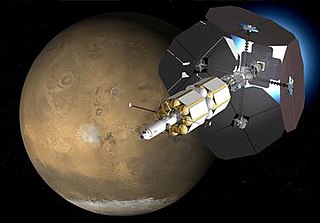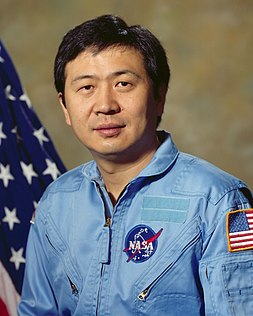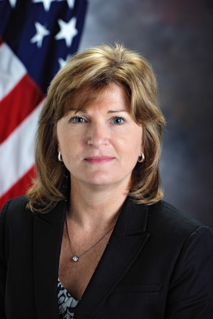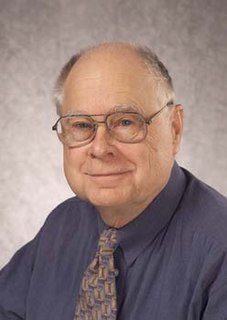
The Variable Specific Impulse Magnetoplasma Rocket (VASIMR) is an electrothermal thruster under development for possible use in spacecraft propulsion. It uses radio waves to ionize and heat an inert propellant, forming a plasma, then a magnetic field to confine and accelerate the expanding plasma, generating thrust. It is a plasma propulsion engine, one of several types of spacecraft electric propulsion systems.

Richard Travis Whitcomb was an American aeronautical engineer who was noted for his contributions to the science of aerodynamics.

Taylor Gun-Jin Wang is a Chinese-born American scientist and in 1985, became the first person of Chinese origin to go into space. While an employee of the Jet Propulsion Laboratory, Wang was a payload specialist on the Space Shuttle Challenger mission STS-51-B.
Larry W. Esposito is an American planetary astronomer and a professor at the Laboratory for Atmospheric and Space Physics, University of Colorado Boulder. A 1973 graduate at the Massachusetts Institute of Technology, Esposito received his Ph.D. in astronomy at the University of Massachusetts Amherst. In 1985, he was awarded the H. C. Urey Prize by the American Astronomical Society. He was also awarded The NASA Medal for Exceptional Scientific Achievement, and the Richtmeyer Lecture Award from the American Association of Physics Teachers and the American Physical Society. His current work involves planetary atmospheres and ring systems.

The NASA Exceptional Achievement Medal is an award of the National Aeronautics and Space Administration established in 1991. The medal is awarded to both civilian members of NASA and military astronauts.

Heidemarie Martha Stefanyshyn-Piper is an American Naval officer and former NASA astronaut. She has achieved the rank of Captain in the United States Navy. She is also a qualified and experienced salvage officer. Her major salvage projects include de-stranding the tanker Exxon Houston off the coast of Barbers Point, on the island of Oahu, Hawaii, and developing the plan for the Peruvian Navy salvage of the Peruvian submarine Pacocha.

The NASA Exceptional Administrative Achievement Medal is an award given by NASA to any person in the United States federal service for a significant, specific accomplishment or contribution characterized by unusual initiative or creativity that clearly demonstrates a substantial improvement in administrative support contributing to the mission of NASA, such as:

Charles L. Bennett is an American observational astrophysicist. He is a Bloomberg Distinguished Professor, the Alumni Centennial Professor of Physics and Astronomy and a Gilman Scholar at Johns Hopkins University. He is the Principal Investigator of NASA's highly successful Wilkinson Microwave Anisotropy Probe (WMAP).

lThe NASA Exceptional Scientific Achievement Medal was established by NASA on September 15, 1961 when the original ESM was divided into three separate awards. Under the current guidelines, the ESAM is awarded for unusually significant scientific contribution toward achievement of aeronautical or space exploration goals. This award may be given for individual efforts that have resulted in a contribution of fundamental importance in this field, or have significantly enhanced understanding of this field.
Homâyun Serâji was an Iranian scientist, engineer, a JPL senior researcher and former professor of Sharif University of Technology who published extensively in the field of multivariable control systems, focusing on optimal control, pole placement, multivariable PID controllers, and output regulation. Also he has significant publications in the field of Robotics, and space exploration.
The NASA Decadal Planning Team (DPT) and its successor, the NASA Exploration Team (NExT), were influential behind-the-scenes efforts to develop a major new direction for the space agency early in the 21st Century.

Lesa B. Roe is an American aerospace engineer who currently serves as the Chancellor of the University of North Texas System. Prior to becoming chancellor, Roe served as the Acting Deputy Administrator of NASA from January 20, 2017 to September 30, 2017, and was the Deputy Associate Administrator from May 1, 2014 to September 30, 2017. Roe has also served as the Director of NASA Langley Research Center from 2005 to 2014, the first woman to hold that position. She previously served as the center's Deputy Director from June 2004 until being named Director in October 2005. Roe in totality served 32 years at NASA, managed the employment of over 17,000 employees with a budget of 19.6 billion.

Amy Mainzer is an American astronomer, specializing in astrophysical instrumentation and infrared astronomy. She is the Deputy Project Scientist for the Wide-field Infrared Survey Explorer and the Principal Investigator for the NEOWISE project to study minor planets and the proposed Near Earth Object Camera space telescope mission.

NASA's Exceptional Public Service Medal is a United States government awarded to any non-Government individual or to an individual who was not a Government employee during the period in which the service was performed for sustained performance that embodies multiple contributions on NASA projects, programs, or initiatives.

William J. (Bill) Borucki is a space scientist who worked at the NASA Ames Research Center. Upon joining NASA in 1962, Borucki designed the heat shields for Apollo program spacecraft. He later turned his attention to the optical efficiency of lightning strikes in the atmospheres of planets, investigating the propensity that these lightning strikes could create molecules that would later become the precursors for life. Subsequently, Borucki's attention turned to extrasolar planets and their detection, particularly through the transit method. In light of this work, Borucki was named the principal investigator for NASA's Kepler mission, launched on March 6, 2009 and dedicated to a transit-based search for habitable planets. In 2013, Borucki was awarded the United States National Academy of Sciences's Henry Draper Medal for his work with Kepler. In 2015 he received the Shaw Prize in Astronomy.

Andrew Perry Ingersoll is a professor of planetary science at the California Institute of Technology. Ingersoll was elected to the American Academy of Arts and Sciences in 1997. He received the lifetime achievement award in planetary science, the Gerard P. Kuiper Prize, in 2007. He proposed the runaway greenhouse effect and is known for his research on planetary atmospheres and climate.

The NASA Exceptional Public Achievement Medal is an award of the National Aeronautics and Space Administration established in 2012. The medal is awarded to any non-Government person or to any person who was not a Government employee when the service was performed.

The NASA Outstanding Public Leadership Medal is awarded to individuals who were not Government employees during the period in which the accomplishment was achieved, "for notable leadership accomplishments that have significantly influenced the NASA Mission."

Claire Lucille Parkinson is an American Earth scientist and climatologist at NASA's Goddard Space Flight Center.
















